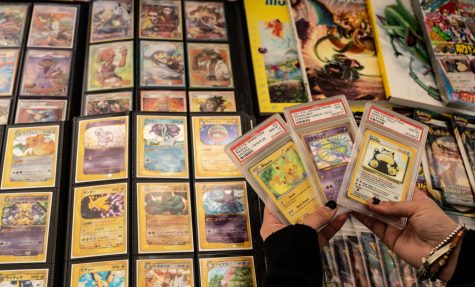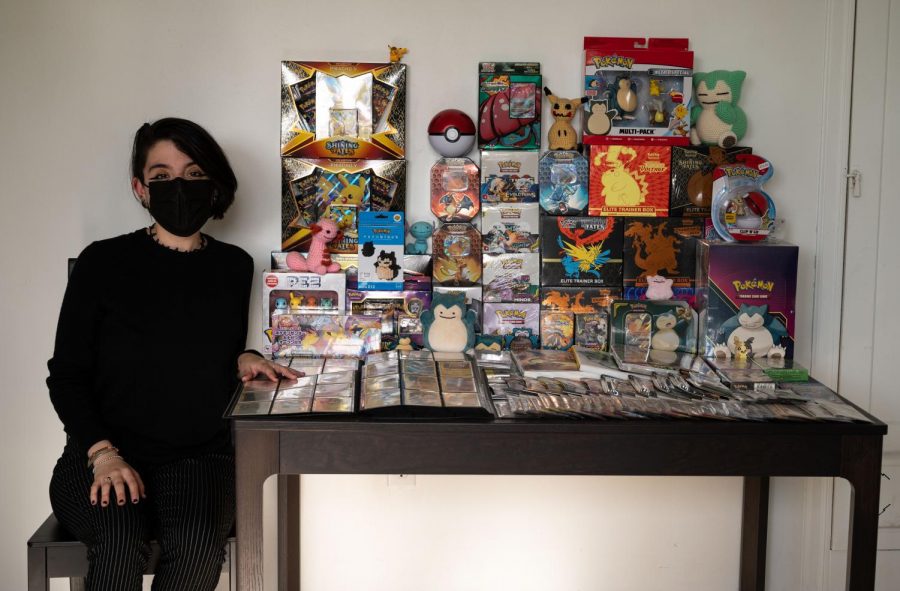Micky Gallegos looked fondly at the matte and chrome suitcase sitting on the table in front of her, thousands of dollars within her reach. As she undid the side clamps and lifted the lid, one could see the soft black fabric lining the interior, shaped into columns, nestled into which were her prized possessions.
“Pretty much everything in this case is not going anywhere, it’s staying with me,” she said as she pulled out a bright yellow card held in a clear plastic casing.
On it was the recognizable visage of the Pokémon, Pikachu — the mascot of an entire generation. Last month, Gallegos sold a similar card for $1,500, which she paid $50 for two years earlier. This uptick was no coincidence.
Pokémon started out in the mid-1990s as the passion project of its creator, Satoshi Tajiri, who wanted to translate his childhood hobby of bug catching into a video game. Upon its release for the Gameboy in 1996, Pokémon was an instant hit that gradually turned into a bonafide worldwide phenomenon and is to this day the highest-grossing media franchise of all time.
In the quarter-century since its release, the game series has spawned 37 mainline entries, which have sold a combined 264 million copies, as well as one of the most successful trading card games of all time.
As millennials entered the job market in the 2000s and 2010s, some used their newfound disposable income to relive, revere and capitalize on their childhood nostalgia. In the past nine months, Pokémon cards have seen a massive surge in value, leading many to hop on board the hype train and invest themselves.
29-year-old Blaine Asbury, who collects cards like Gallegos, isn’t as invested in selling them. Asbury remembered traveling with their parents to Walmart as a child and getting card sets for a game that they didn’t even know how to play. They were content with the intricate drawings of a given card’s Pokémon: larger-than-life imaginary creatures sporting vivid colors and expressive faces.
As an adult, Asbury spent $300 on a complete set of the original Pokémon cards, which they estimated to currently be worth $2,000.

With almost 900 Pokémon out there and more being “discovered” every year, there was no shortage of cards to collect.
“I’m more in love with the discoverability aspect of the universe,” Asbury said. “I love that I don’t know everything about it.”
The cards also served a second purpose as a sort of social utility, giving students something to form bonds over. “Everybody at school knew everything that I knew, and we were all in this frenzy together,” Asbury said.
The cards’ utility has gone from schoolyard banter to a more financial nature. Scott Pratte grew up with Pokémon in his childhood before growing back out of it in his adolescence, having never felt the kind of intense personal attachment to the franchise that Gallegos or Asbury did in the interim.
And yet, after having been reintroduced to Pokémon card collecting in college, he now claims to “mathematically” be the world’s most prolific high-end Pokémon card seller.
“Before, it was more like a side-gig, but now there’s no time for anything else,” he said. Some of his most prized cards are bought from an exclusive Japanese distributor, since Japan produces select cards that can’t be found elsewhere.
Three million dollars — that is the highest price for one of Pratte’s cards currently on eBay, with the item page calling it “the most valuable Pokémon card in existence.”
Pratte has closed other seven-figure deals in the past, though non-disclosure agreements prevented him from disclosing the exact amount. Of the over 200 cards for sale on his eBay page, a handful are selling for over a million dollars and dozens more are in the thousands.
All this to say that Pokémon cards have become to millennials what beanie babies were for Gen X or baseball cards were for Baby Boomers — a child’s pastime, with those children now grown up and willing to spend large sums on nostalgic merchandise. However, there has been a recent trend that caused cards like Gallegos’ Pikachu to skyrocket in value, beginning in September 2020.
Pratte saw this as the result of an entire generation being stuck indoors with money to spend and nostalgia to quench. “Here’s this hobby that can be a collectible-slash-investment and it was really the perfect storm in the past year for growth,” Pratte said.
But there had to be a catalyst for this surge in growth. David Luong, manager at the Divisadero Street game store, Gamescape, credits this boom with the rise of social media influencers who have made opening card packs a video genre in its own right. The appeal is similar to that of gambling: the random nature of each pack, not knowing if it might contain an ultra-rare card and the endorphin rush of watching somebody freak out on camera when they finally strike gold.
He said that Gamescape saw close to a 500% increase in Pokemon card sales over the last year.
“Youtubers were reigniting nostalgia in a lot of people by opening older booster packs as video content,” said Luong. “That definitely brought a lot more interest into it.”
I’m more in love with the discoverability aspect of the universe. I love that I don’t know everything about it.
— Blaine Asbury
Anthony D. Veloz is the owner of Versus Games, a Taraval Street game store and event location for TCG tournaments. He sees momentum in the phenomenon, although he estimates it will eventually run out of steam.
“Once the pandemic is over and things are settling down […] and production gets back to normal, then you’re going to probably see a slowdown,” Veloz said.
Veloz’s relationship with Pokémon was always all business. Ironically, COVID-19, which was massively beneficial to most individual Pokémon card sellers, put retail businesses like Versus Games at tremendous risk of closure.
To stay afloat, Veloz said that he had to fundamentally rework his business model to focus almost exclusively on distribution. This has allowed the store to not only survive but even expand its staff.
To go a step further and stay ahead of the curve, Veloz compared measuring Pokémon card trends and values to the stock market.
“My job is to watch everything and to know everything,” Veloz said. “And see all this information as it comes in from six, seven different sources, analyze it and see if there’s a connection. And that’s exactly what I was doing the whole time.”
One industry insight, according to Veloz, is the COVID-19-induced scarcity of available card printers. As a result, franchises like Pokemon are using what little printer access they can get to print out new cards and stay on schedule with planned releases. Without the usual printing of some older cards, they have become far rarer than intended and have seen their values soar.
Ultimately, the Pokémon card market reflects millennial nostalgia itself. Despite selling a children’s card game, Veloz said most of his customers are actually in their 20s and 30s, with people like Gallegos, Asbury and Pratte fitting that mold themselves.
“I’m older now. I have the income, I have the money to do this — let’s turn this into a real hobby, a real investment,” Gallegos said. “I see myself doing this for a very, very, very long time.”











